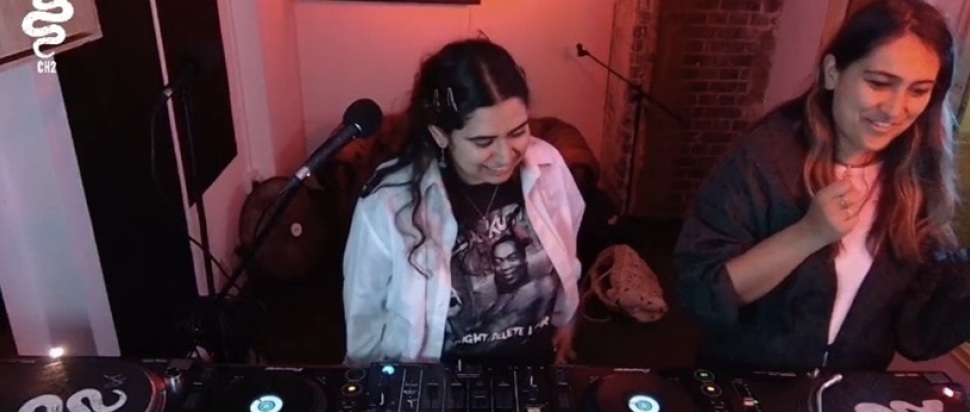Migration Sounds: How radio travels distances
How does music cross a border? Laila Ghaffar reflects on curating connection via co-hosting a radio show amid ongoing border tensions between India and Pakistan
On Tuesday 22 April, 26 Indian civilians were killed in the town of Pahlagam in Indian-administered Kashmir. Nobody has taken responsibility for the attack, and there remains no conclusive evidence from which to draw blame. On Wednesday 7 May, India launched three missile attacks on Pakistan, marking the worst confrontation between the two nuclear-armed countries in over two decades. On Friday 9 May, I plugged my USB into the decks at AAJA radio station in South London to play a monthly radio show, Humraaz, which I co-host with my friend Trisha.
I was born in London, but I am from Pakistan. Trisha was born in Delhi, before her family migrated to Britain when she was five. Humraaz is an exploration of South Asian culture, history and politics, grounded firmly in the music of the region. But the day before our May show, I realised that there would be no poetic way to convey my rage, despair, fear and disgust. No clever turn of phrase or pithy analysis. I texted Trisha: "Let’s only play Kashmiri music." "Great idea," she replied.
It was not my choice to be a child of Pakistani immigrants, but it is my choice how I choose to relate to Pakistan and this facet of my identity. Through sheer luck, my family had the financial resources to fund annual trips to Lahore, where my mother’s family still lives. I spent every winter for the first twenty-three years of my life in Pakistan. I did not grow up with any romantic or mythical illusions of the country or its landscape or culture nor do I refer to Pakistan as the motherland. To me, Pakistan has always been messy, complicated and difficult. But it is also, in many ways, my home. I suspect many Pakistanis would balk at me describing Pakistan as my home because the longest I have lived there at any one time is six months. But I have no interest in justifying the way I feel. As I said, it’s my choice how I choose to relate to Pakistan.
Trisha and I conceived of Humraaz as a way to explore, challenge and play with our respective identities via music. Each month, we carefully curate a joint tracklist for the show. Through this act of musical co-curation, I share my Pakistan with Trisha; Trisha shares her India with me, too. She giggles whenever she presses play on a dizzyingly energetic Punjabi track. "God, I love how much fun we are," she laughs. More often than not, she will add a melodramatic romantic Bollywood ballad onto the track list, betraying a childhood spent rehearsing Bollywood dance routines and iconic lines in front of the mirror. I love these insights into both her past and present relationship with India.
I like to think that my additions to the playlist have taught Trisha, and our audience, about the ways in which I think and feel about Pakistan. I play Qawwali, a form of Sufi devotional singing which reminds me of cold December nights in Lahore and my aunt swaying her body with true abandon. I add songs by legendary singer Farida Khanum, her dulcet tones soothe me like a cool balm to a burn. I play Ali Seth’s music, his genre-bending melodies and playful lyrics reminding me that Pakistanis are indisputably the funniest people in the world. Listening to Pakistani music draws me closer to myself: it is an invitation home.
I have my own deluded and romantic notions that Humraaz represents South Asia without borders. That our radio show is an attempt to re-map India, Pakistan and Bangladesh, realising a free and borderless cartography. It is, frankly, embarrassing to say that art has no borders. Obviously, this is not the case. The trade of material goods and objects between India and Pakistan has practically halted: as such, music is one of the only cultural exports that can be exchanged freely. Sometimes I add Indian music to the show’s tracklist, and Trisha adds Pakistani music. After all, we speak the same language.
Humraaz is a joyous offering to the world, but we cannot ignore the violent realities of the Indian Subcontinent. This recent military altercation has been frightening for both Indians and Pakistanis, but Kashmir remains the primary victim of the ensuing chaos and cruelty. As we played each Kashmiri track on the show, I felt powerless. I still do. But if Humraaz is our way to stay in dialogue with India and Pakistan, then I hope music can help us convey something softer, peaceful and more hopeful than what has passed.
Listen to Humraaz on the second Friday of the month, 7-9pm, via aajamusic.com
